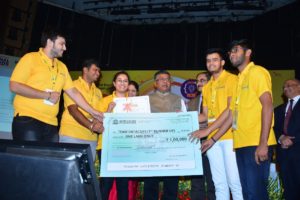
The Minister of Electronics and Information Technology (MeitY) has called for a tech-movement headed by Indian IT professionals to help India become a fully digital society.
The Minister, Mr Ravi Shankar Prasad, urged the Indian IT community to help spread digital awareness to the underprivileged areas of the country.
If digital literacy infiltrates the remote parts of India, people below the poverty line are more likely to know about and benefit from Government schemes and initiatives.
The Government has made 200,000 datasets available on an open data platform. This is to provide equal opportunities for digital innovation to its citizens. Government departments publish the datasheets directly on the platform.
The Government does not want data to only be accessible to the privileged few. Larger involvement will have more effective results.
A large number of villages have been given access to the internet already. The Government has helped millions of Indians become more technologically literate, offering access to products and services. Digital payment methods have been a crucial medium for digital awareness.
According to data from the Reserve Bank of India (RBI) and the National Payments Corporation of India (NPCI), transactions made under the Unified Payments Interface (UPI) saw a 30% increase in September, as a greater number of the population have started using the service to pay for offline purchases, bill payments, cab-rides, among several other utilities.
The Open Government Data (OGD) Platform India is at the forefront of innovation promotion in the Open Data ecosystem in India. Set up by the National Informatics Centre (NIC), the platform aligns with the Open Data policy, which is to provide a space for proactive access to government-owned shareable data.
The National Informatics Centre is heavily involved in e-government applications. It functions as a developer and promoter of digital opportunities for sustainable development. NIC, through its ICT Network, “NICNET”, has institutional linkages with government ministries and departments.
Currently, OGD India has 229,793 dataset resources and 137 government departments have contributed about 4,431 catalogues.
The platform hosts 7,860 Application Programming Interfaces (APIs). The OGD space has around 17.13 million views and 6.22 million datasets from its platform have been downloaded.
The OGD Team and the National Informatics Centre (NIC) in association with the Internet and Mobile Association of India (IAMAI) organised a Hackathon. A Hackathon is an event where computer programmers and other experts in the business of software development collaborate on software projects.
Graphic designers, interface designers, project managers, and students attended the “#OpenGovDataHack” event. They worked to together to create state-of-the-art service delivery applications and info-graphics.

Water and sanitation, transport, education, crime and health were the areas addressed during the event. The Hackathon was conducted in two phases. The national screening committee shortlisted 20 apps for final presentation. Out of those, 3 winning apps and 7 participatory apps were felicitated in an award event by the IT Minister.
The Government launched the platform in recognition of the importance of accessible, open data. It will increase the level of proactive transparency and accountability. It aims to increase public participation.
The OGD organises IT-related app challenges, hackathons, training sessions, and state-level workshops.
















